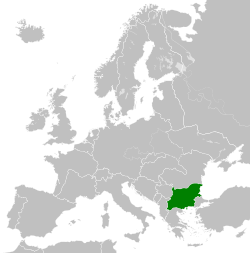Kingdom of Bulgaria
| Tsardom of Bulgaria | ||||||||||||||
| Царство България Tsarstvo Bŭlgariya |
||||||||||||||
|
||||||||||||||
|
||||||||||||||
|
Motto God is with us Бог е с нас (Bulgarian) Bog e s nas (transliteration) |
||||||||||||||
|
Anthem "Maritsa Rushes" Шуми Марица (Bulgarian) Shumi Maritsa (transliteration) Royal anthem |
||||||||||||||
|
The Kingdom of Bulgaria in 1942.
|
||||||||||||||
| Capital | Sofia | |||||||||||||
| Languages | Bulgarian | |||||||||||||
| Religion | Bulgarian Orthodox | |||||||||||||
| Government | Constitutional monarchy | |||||||||||||
| Tsar (King) | ||||||||||||||
| • | 1908–1918 | Ferdinand I | ||||||||||||
| • | 1918–1943 | Boris III | ||||||||||||
| • | 1943–1946 | Simeon II | ||||||||||||
| Chairman of the Council of Ministers | ||||||||||||||
| • | 1908–1911 | Aleksandar Malinov (first) | ||||||||||||
| • | 1944–1946 | Kimon Georgiev (last) | ||||||||||||
| Legislature | National Assembly | |||||||||||||
| Historical era | World War I / World War II | |||||||||||||
| • | Independence declared | 22 September (o. s.) 1908 | ||||||||||||
| • | Balkan Wars | 1912–1913 | ||||||||||||
| • | Treaty of Bucharest | 10 August 1913 | ||||||||||||
| • | Treaty of Neuilly | 27 November 1919 | ||||||||||||
| • | Coup d'état | 9 September 1944 | ||||||||||||
| • | Monarchy abolished | 15 September 1946 | ||||||||||||
| Area | ||||||||||||||
| • | 1908 | 95,223 km² (36,766 sq mi) | ||||||||||||
| • | 1946 | 110,994 km² (42,855 sq mi) | ||||||||||||
| Population | ||||||||||||||
| • | 1908 est. | 4,215,000 | ||||||||||||
| Density | 44.3 /km² (114.6 /sq mi) | |||||||||||||
| • | 1946 est. | 7,029,349 | ||||||||||||
| Density | 63.3 /km² (164 /sq mi) | |||||||||||||
| Currency | Bulgarian lev | |||||||||||||
|
||||||||||||||
| Today part of |
|
|||||||||||||
Royal anthem
"Anthem of His Majesty the Tsar"
Химн на Негово Величество Царя (Bulgarian)
Himn na Negovo Velichestvo Tsarya (transliteration)
The Kingdom of Bulgaria (Bulgarian: Царство България, Tsarstvo Bǎlgariya), also referred to as the Tsardom of Bulgaria and the Third Bulgarian Tsardom was a constitutional monarchy, which was established on 5 October (O.S. 22 September) 1908 when the Bulgarian state was raised from a principality to a kingdom. Ferdinand I was crowned a Tsar at the Declaration of Independence, mainly because of his military plans and for seeking options for unification of all Balkan lands with an ethnic Bulgarian majority (lands that had been seized from Bulgaria and given to the Ottoman Empire in the Treaty of Berlin).
The state was almost constantly at war throughout its existence, lending to its nickname as "the Balkan Prussia". For several years Bulgaria mobilized an army of more than 1 million people from its population of about 5 million and in the next decade (1910–20) it engaged in three wars – the First and Second Balkan Wars, and the First World War. Following the First World War the Bulgarian army was disbanded and forbidden to exist by the Allied powers, and all plans for national unification of the Bulgarian lands failed. Less than two decades later Bulgaria once again went to war for national unification as part of the Second World War, and once again found itself on the losing side, until it switched sides to the Allies in 1944. In 1946, the monarchy was abolished, its final Tsar was sent into exile and the Kingdom was replaced by the People's Republic of Bulgaria.
...
Wikipedia



